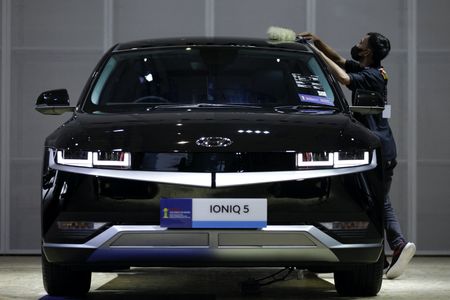 1
1 1
1

By Bernadette Christina and Stefanno Sulaiman
JAKARTA (Reuters) – Sales of electric cars in Indonesia jumped last month after the government launched tax incentives, auto executives said, in an early sign that electric vehicle (EV) adoption is gaining traction in Southeast Asia’s largest economy.
Effective from April, Indonesia cut the value-added tax (VAT) on electric cars from 11% to just 1%, provided they are manufactured with at least 40% local content.
Hyundai Motor Co’s sport-utility vehicle IONIQ 5, a model eligible for the tax cut, saw sales jump three-fold to more than 600 units in April compared with the previous month, Sanghoon Yoon, an executive with Hyundai Motor ASEAN told Reuters on the sidelines of a seminar on energy transition in Jakarta.
“At the moment EVs are very expensive because of the battery,” Yoon said on Tuesday. “So I think in the beginning we need a kind of subsidy from the government and it will increase the demand for EVs.”
Hyundai aims to sell 10,000 units of IONIQ 5 in Indonesia this year, helped by the tax cut and as a shortage in semiconductor chips eases, he said.
That compares with 3,000 units sold since the model was launched in 2021.
Sales of Wuling Air EV, a small car manufactured by SGMW Motor Indonesia, part of a joint venture (JV) that includes Chinese firm Wuling Motors Holdings, surged by more than 80% on a monthly basis to more than 740 units, said Dian Asmahani, marketing director for the Indonesian arm of the JV.
The two models are the most popular electric cars in Indonesia.
Hyundai’s Yoon said the South Korean company plans to introduce more battery-EV models in Indonesia to capture the growing market.
Fitch Ratings said in February sales of four-wheeled EVs, including hybrid models, in Indonesia is expected to exceed 50,000 units in 2023, up from 20,681 units last year, noting that government incentives could provide potential upside to the forecast.
(Reporting by Stefanno Sulaiman and Bernadette Christina; Writing by Gayatri Suroyo; Editing by Kanupriya Kapoor)